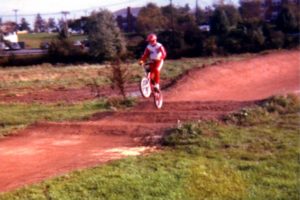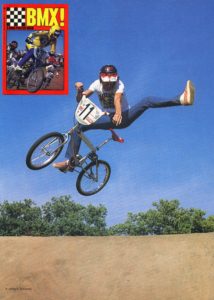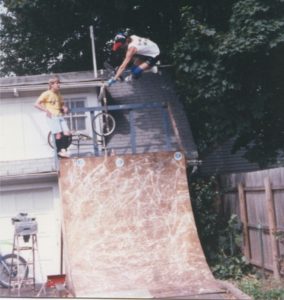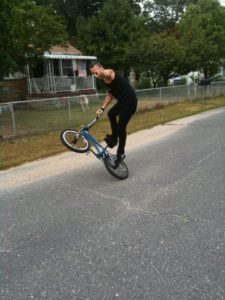From 1978 until 1996, BMX, either racing or freestyle, was my entire life. From the moment I got up and either went to school or later in life, went to work, the ultimate goal was to get back near that bike and make something happen on it. Get a new part, a new shirt, win a race, head out to the trails, learn a trick, build a ramp,
travel to a contest, see a freestyle team’s show, start my own team, do my own shows, do my own contests, even build my own ramp park, BMX was all I ate, slept and dreamt about.
In my late 20’s though, injuries and the bills that come along with them began to mount and beyond just the physical toll, the mental toll began to creep in. Getting hurt sucks. Getting hurt and then not being able to pay the bills can make that pain even worse. It became apparent to me that as I began to drift into my 30’s I would not be able to continue to be “hardcore BMX guy”. Since all I had known my entire working life was either riding and promoting BMX, hard laborious work or working in a bike shop I began to realize that I needed to, as painful as it was to my soul, look for something to do outside of BMX to make a living.
Why not just work in a bike shop, open one up or look for work “in the industry”. Well, when I was on my way out during that time the choices were slim for BMX work in the bicycle industry and quite frankly, I was never one to really be into any other form of cycling beyond BMX. After losing my ramp park, the Ramp-Ateria, the dream of “BMX as a living”, no longer seemed valid. I was, in effect, burnt out.
Fortunately for me, around this time I met my future ex-wife and also got involved in playing around with personal computers. Both of which would lead me in directions in my life I never would have thought of when I graduated high school in 1984. I also secured employment at a traffic control producing company with a job that took a much less demanding toll on my body during working hours.
Now some people just wake up one day and decide to drop something they have loved since childhood like a hot potato (WOW, what a corny reference…but true!) not me though, I slowly faded from the scene till I was just a rumor of a person who used to be around. “Whatever happened to Brett?”, “I dunno, he met that girl and just sorta faded out”. I became what most guys who were into BMX during my early years became, “just another dude who got involved with a woman and left the scene”. Albeit I did so at 30…and not 16. A Jump For Joy here, a quick trail session there, flatland in a lot with an old friend or a visit to a local skatepark. Moments, but no longer the BMX warrior I once was.
 For some the removal of a passion in their life can cause many problems emotionally and mentally. For me though, I was able to move on with relative ease. I saw the writing on the wall and resigned myself to learning new skills and having fun in other ways. I didn’t really leave BMX, I kept the mentality of anything is possible…I would say I branched out from BMX to explore my abilities elsewhere.
For some the removal of a passion in their life can cause many problems emotionally and mentally. For me though, I was able to move on with relative ease. I saw the writing on the wall and resigned myself to learning new skills and having fun in other ways. I didn’t really leave BMX, I kept the mentality of anything is possible…I would say I branched out from BMX to explore my abilities elsewhere.
Using the open mind that BMX riding had taught me, I dove into my new job with the attitude that, “well even if I had never done this before and didn’t know what I was doing, did not mean I couldn’t do it.” This led to a spurt of learning not only much about what it takes to control traffic control but something that eventually would take much of my free time and excess creative ability. That being computers. The ins and outs of building them, fixing them and when I realized the potential, using them for creative endeavors. Suddenly what used to be a massive chore when I was younger, designing characters, magazines, pamphlets, video making, promotion, became something massively fun and entertaining. I had branched out beyond BMX and after a time of massive learning, eventually went back to BMX for a stint at locally promoting freestyle and racing.
That lasted a few years and I realized that I had my time in BMX and done everything I personally could to the potential I wanted. I left the scene and started to use all the abilities I now had for creative ideas that had been percolating in my mind for a while.
When you leave something that you truly love because you feel you have lost the passion for it, it can be an emotionally draining experience. Your mind will question not only what happened to that passion but why did that passion exist in the first place. For some this will lead down darker paths. Questioning how they can keep going after their main passion in life is gone. Even if they have people in their lives who are upbeat and love them, the internal workings of people who lose their passion for doing things they love can only be understood by others who have had the same happen to them.
Drive and passion are interesting things. For some, they enjoy the external rewards of other people’s adulation in accomplishing what they do and that keeps them going, for others, it is simply the act of doing what they do that keeps them motivated. For those people, whether someone tells them they are doing great or not, they would keep on doing what they love. For a small group of people though, the act of doing evolves into the external reward of others praise which then can lead to an ever growing need for that same reassurance that what they are doing is worthwhile not just for themselves but for others. In effect, they go from doing what they love for themselves, to doing what they love for others. After time, this will kill the passion that existed in the first place and when the realization comes that the passion is no longer there, there is no way to ever get it back again. Some people will look all over doing many different things to try and get that feeling again but nothing ever will feel the same because that one thing that made you happy when it was just “something you loved to do for yourself”, becomes an entity that you no longer control.
This can lead to a dangerous condition which is known by laymen as “believing other people’s bullshit.” People who have no emotional ties to you will tell you your the greatest during times when you are not the best. People you don’t know at all will ridicule and cut deep into your core and make you question why you ever did  the thing you loved in the first place.
the thing you loved in the first place.
Your mind will become a swirling mass of “why, which direction is better, what happened to the person I used to be”, and most importantly, “how do I get that feeling back?”
It never really does come back though. In life, you have to sometimes realize when it is just “time to move on”. With myself and BMX it was twice. Once in the late 90’s and again in the mid 00’s. BMX itself had changed for me, and though I still had good feelings for it and loved to play on my bike on occasion, the passion left me for going at it full bore.
Earlier this year one of BMX’s most famous, most well spoken and well liked stars, in reality, its first real public superstar, Dave Mirra, took his life at the age of 41. Five years after his retirement and with seemingly the greatest support system of family, friends and fans, he left them all having made his own decision about his future. For many of us who watched Dave grow up around the sport and saw his ability to expand the horizons of BMX beyond just “men riding little bicycles”, this was a pretty heavy blow. We all looked at Dave as the guy who  really legitimized the pain and ridicule we all got by continuing to pursue riding BMX well past when most deemed it “cool”. I would never venture to guess why he did what he did but I can tell you that for many of us first generation BMXers we have had that moment of questioning everything. The moment where we ask ourselves, “why did I do all this, what was the point, and where the hell am I going now because all that fire of youth…is just not there anymore.”
really legitimized the pain and ridicule we all got by continuing to pursue riding BMX well past when most deemed it “cool”. I would never venture to guess why he did what he did but I can tell you that for many of us first generation BMXers we have had that moment of questioning everything. The moment where we ask ourselves, “why did I do all this, what was the point, and where the hell am I going now because all that fire of youth…is just not there anymore.”
The question we all think about is, “what do we do after BMX?”
The answer though, is, there isn’t a “after BMX” for those of us who truly loved it. It will never become something we can just compartmentalize and say “well that is over”, “I’m done”. It will always be with us as part of our core being. It doesn’t become something “we did”, it turns into something that “we are”. We’ll drive down the road and see a little kid on a department store BMX bike pulling their front end up and smile to ourselves, “yep, that’s how it starts”, we’ll stop at a skatepark to see some people ride and laugh in our minds about how we had to build ramps out of “midnight lumber yard runs”, we’ll always have that mindset of “why can’t I”?, as opposed to “I can’t, can I?”.
My point is, when the time comes that you realize you can’t or aren’t pushing yourself like you used to, don’t let it stress you out, don’t let it bring you down. There’s no need. It happens. It happens to every generation, we start to get to the point where the risk is not worth the reward. The one thing though that you can always hang your hat on, that you will always have that no one else did, is the fact that you tried, you went for it. You didn’t settle for the status quo, you pushed up against that wall of tradition and normality till either you or it gave out. Not many people will do that. They’ll conform immediately to what society tells them, to what their parents force them into but you, the BMXers, you went out and did it your own way.
Life “after’ BMX…is life with a BMX mindset even without the stunts and tricks.

